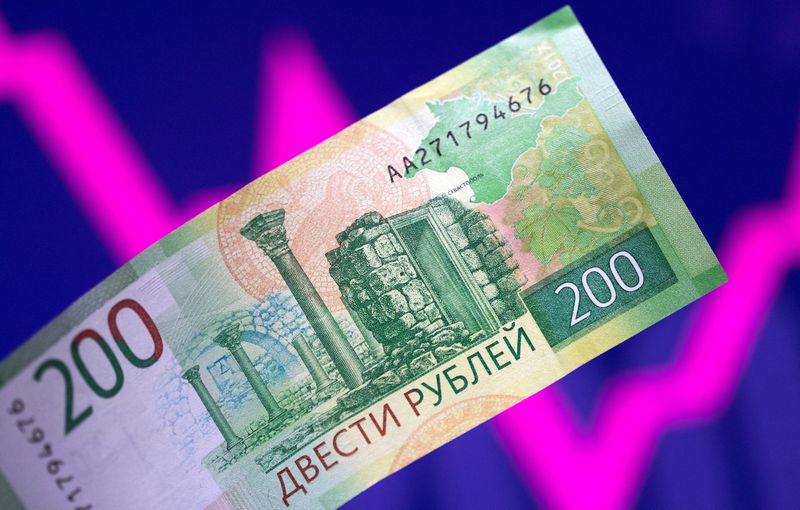MOSCOW (Reuters) - Russia plans to tap its National Wealth Fund (NWF), a rainy day cushion, after it scrapped its borrowing plan this year amid Western sanctions and said it would spend up to 1 trillion roubles ($9.34 billion) to buy shares in Russian companies.
The plan to tap the fund, originally designated to help the budget to cover pension fund's deficit, comes as Moscow faced harsh economic sanctions from the United States, European Union and their allies after Russia invaded to Ukraine last week.
Russia calls its actions in Ukraine a "special operation" that it says is not designed to occupy territory but to destroy its neighbour's military capabilities and capture what it regards as dangerous nationalists.
The sanctions saw a big part of the central bank's gold and foreign exchange reserves frozen and its biggest banks were cut off from the SWIFT international banking messaging system.
Forex assets held by the NWF are part of Russia's overall gold and forex reserves of $643 billion.
HOW BIG IS THE FUND?
Under a fiscal rule adopted in 2017 to strengthen the NWF Russia buys foreign currency when oil prices are high and sells when prices go below $44 per barrel, shielding the rouble from oil price swings.
The fund had 13.6 trillion roubles, equal to 10.2% of the gross domestic product initially projected for 2022, or $174.9 billion, as of Feb. 1, according to the finance ministry.
ARE ALL THE NWF'S ASSETS AVAILABLE TO USE?
Out of total $174.9 billion, liquid part of the fund, or assets at the central bank's accounts, stood at $112.7 billion, or 8.8 trillion roubles, equal to 6.6% of GDP projected for this year as of Feb. 1, the ministry said.
In cash, the central bank holds:
- 38.6 billion euros;
- 4.2 billion British pounds;
- 600.3 billion Japanese yen;
- 226.8 billion Chinese yuan;
- 405.8 tonnes of gold in cash equivalent;
- 266 million roubles
HOW MUCH OF NWF IS INVESTED INTO NON-LIQUID ASSETS?
- 530.6 billion roubles in deposits at the state development bank VEB, as on Feb. 1, the ministry said;
- $3 billion in foreign countries' debt instruments;
- 294.8 billion roubles and $4.1 billion worth of Russian securities linked to large infrastructure projects;
- 279 billion roubles worth of preferred shares at a number of banks;
- 138.4 billion roubles at subordinated deposits held at VTB and Gazprombank and related to large infrastructure projects;
- 3 trillion roubles of Sberbank shares;
- 47.4 billion roubles of Aeroflot shares
($1 = 107.1000 roubles)
